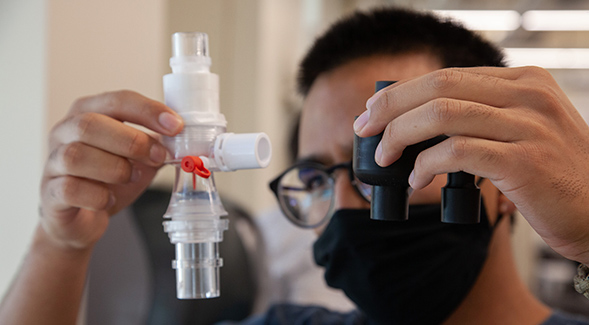
More than 40 projects tackle the coronavirus from nearly every angle.
By Kellie Woodhouse
San Diego State University has become the site for dozens of COVID-19 research projects, an urgent response to the pandemic that is probing its impact on individuals, health care professionals and communities while looking ahead to possible interventions and solutions.
More than 40 COVID-related projects span all seven of the university’s academic colleges as well as SDSU Imperial Valley.
Much of the work draws upon SDSU’s deep roots in the community, allowing investigators to collaborate with local government agencies, health care providers, medical companies and nonprofits and ensure their work has the widest reach and greatest impact possible.
“During the pandemic SDSU faculty have risen to the occasion and leveraged their expertise, connections, scholarship and research interests to shed light on the coronavirus and support vulnerable communities, especially those here in San Diego,” said Hala Madanat, interim vice president of research and innovation and the leader of multiple COVID-19 research endeavors.
The vast array of projects considers how the virus affects the body and lingers in the environment; how the pandemic has affected health care, under-resourced communities and mental health; and how schools, government agencies and individuals have responded to the crisis.
“SDSU faculty have faced the challenges of COVID-19 without hesitation,” said President Adela de la Torre. “We have the expertise, the critical connections, and the tenacity to confront major challenges head-on.”
This is the first in a five-part series highlighting SDSU’s COVID-19 research and scholarship, both completed and ongoing. This installment focuses on efforts to study and improve health care during the pandemic.
For information on all COVID-19 related research, visit research.sdsu.edu/covid-19-projects.
Impact on Providers
School of Nursing professors Christine Nibbelink and Willa Fields are exploring factors that influence acute care nurse decision-making when caring for patients with COVID-19. The research team is surveying acute care nurses, and their qualitative research will explore previously unknown factors that guide nurse decision-making during a pandemic.
“COVID-19 is a novel virus that demands effective nurse decision-making under unique circumstances,” Nibbelink said.
Eric Post, a professor in the School of Exercise and Nutritional Sciences, is studying the preparedness and challenges of athletic trainers at the NCAA Division I, II, and III levels as colleges and universities resume sport participation during the pandemic.
Nursing professors Amanda Choflet and Judy Dye are collaborating with Sharp HealthCare to study the effect of COVID-19 on the stress, coping and anxiety levels of nurses. They will conduct an anonymous survey analyzing how the pandemic affects mental health outcomes in nurses. By comparing outcomes across specialties, they will identify high-risk groups and work with the health system to prepare community-level interventions.
Health Care Solutions
Biology professor David Lipson is partnering with San Diego biotechnology company Menon Biosensors and University of California San Diego researchers to develop a new COVID-19 test using a combination of molecular biology and nuclear magnetic resonance technology. They aim to create a high throughput testing system that circumvents the need for standard real-time polymerase chain reaction (PCR) testing.
Early in the pandemic, several SDSU engineering professors and their students created low-cost assisted breathing devices as a part of a U.S. Department of Defense Hack-a-Vent Challenge in March. Mechanical engineer Kevin Wood and his lab created a prototype that can be assembled with readily available parts to help hospitals in case of a surge in very ill patients needing ventilator assistance.
Going Virtual
As COVID-19 causes health care practitioners to move appointments online, nursing professor Philip Greiner is working to improve the quality of telehealth access in Imperial County. In partnership with primary care partner Clinicas de Salud del Pueblo, he is overseeing development of best practices for telehealth, training workers and funding necessary equipment. The U.S. Department of Health and Human Services awarded Greiner $90,600 in funds from the CARES Act, passed by Congress in response to the pandemic.
JoAnn Silkes, a professor in the School of Speech, Language, and Hearing Sciences, is developing a reliable way of administering language tests remotely to patients with stroke-induced language disorders. The project is motivated by COVID-19 stay-at-home orders and quarantine, when in-person assessments were widely replaced with virtual ones.
As COVID-19 spurs a shift toward virtual health care, engineering professor Kee Moon and his colleagues are developing a digital platform to promote health care. The project will employ wearable sensor technology that uses a novel integration of acoustics and biopotentials to monitor lung movements. The platform will easily collect patient lung health information and quickly and remotely connect health care systems to health care providers, including overwhelmed hospitals. Continuous health monitoring – even when a person shows no signs of illness – offers a significant paradigm shift in future health care. The project is part of SDSU’s Big Ideas initiative.